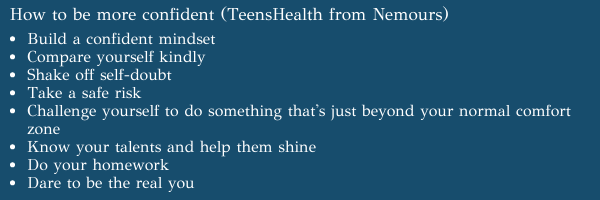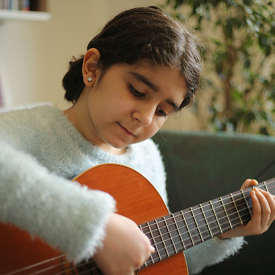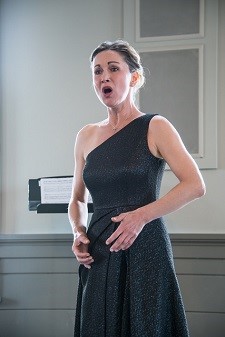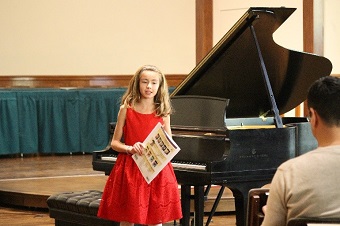Feeling confident!
No matter the age, learning to play an instrument begins with listening to music, reading notes, and developing your technical skills and musicianship. Before long, you can play songs and feel good about where you are on your musical journey. Satisfaction attained, and a dose of confidence to keep you motivated to learn more.
Confidence allows us to tackle our daily challenges. It creates contentment as well as happiness. Believing in ourselves gives us the strength to take calculated risks and make impactful changes in our lives to discover our full potential.

Self-doubt can hold you back from seizing opportunities that come your way. Extreme cases of low self-esteem can produce anxiety and unwarranted stress, affecting your health and happiness. Music is the solution. You and your kids can learn an instrument to develop confidence—that’s when the real fun begins. So, how does it all work?
Learning an instrument builds a child’s self-confidence
The benefits gained from music lessons go beyond your child’s playing ability—it extends to their academic, social, and emotional development. By learning music, they’re on the road for fun, happy,  and fulfilling times.
and fulfilling times.
How can music skills build confidence?
Music is an almighty powerful tool that:
*How Can Music Skills Build a Child’s Self-Confidence (by Darren Perkins, MusicTeachers Helper Blog, November 6, 2018)
Use your voice too!
Not all of us can belt out a tune like Beyoncé, but we certainly should try. Why? Because it feels good and builds our confidence. It gets us in a good mood or settles us down when we need comforting.
 Voice lessons go a step further by giving us the tools to challenge ourselves and overcome insecurities and stage fright.
Voice lessons go a step further by giving us the tools to challenge ourselves and overcome insecurities and stage fright.
CCM faculty member Dr. Greta Feeney explains, “The study of voice builds confidence by refining and perfecting the connections between thinking, breathing, and phonation. Singing is both natural and refined. It is a heightened, emotionally complex activity that requires people to develop faith in themselves and their ability to think on their feet and manage their thoughts and emotions in real-time, finding the kind of balance that lets the singer lead others through their emotional realms heightened states. By showing a deep connection to the meaning behind the music, the singer connects us all and feels the joy and power of that connection. This results in true confidence.”
Need more convincing? Check out Fay Agathangelou’s long list of benefits of singing to boost you and your kids’ self-esteem.
Music builds confidence no matter one’s age
We all can use a shot of confidence now and then, especially teenagers experiencing more stress than ever before.

Music, especially playing in a group, helps teens navigate the inevitable high school academic and social pressures. Of course, it’s a process, and their confidence will develop over time. As chorus, orchestra, or band members, students learning and performing together get connected. Succeeding as a team is a confidence builder. Playing in a group offers teenagers a way to connect with like-minded peers and form friendships.
And, if they happen to snag the solo in a band concert or have the honor as the first chair in an orchestra, they’ve just grabbed another ounce of confidence. They become aware of their actions and the impact they’ve made on the group. They’re leaders in the making.
Music can also help us learn how to give presentations with confidence—a skill that comes in handy no matter what job or field one enters. As CCM faculty member Angel Valchinov explains,  “Performing trains us to master our nerves. Mastering our nerves keeps us more in control and, therefore, more confident. One leads to another! For me, playing and performing have made me wiser. Being wiser also means being more confident in your abilities.”
“Performing trains us to master our nerves. Mastering our nerves keeps us more in control and, therefore, more confident. One leads to another! For me, playing and performing have made me wiser. Being wiser also means being more confident in your abilities.”
It’s recital time!
At CCM, we give young students the ability to say, “I am a musician!” A lot happens before a student can perform. They have to master technical skills and practice diligently until they get their selected piece performance-ready and polished. They learn how to fix problems with their playing. Instructors provide constructive and positive feedback inspiring their students and arming them with that can-do attitude. Students learn how to be ready and confident to perform.

CCM students learn recital deportment: how to introduce themselves, the proper way to sit or stand, and how to bow at the end of their performance. In other words, they are learning best practices for making a presentation, a skill that will prove essential as an adult.
Finding the right music instructor makes a world of difference for your confidence—someone who understands your needs and gives appropriate and constructive feedback. If you’re ready to make that leap and start your musical journey, let us know, and we’re here to help you get started.
Back To Top